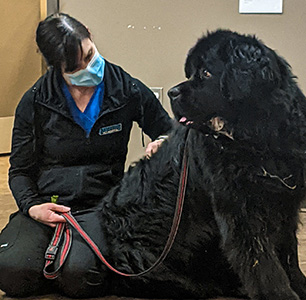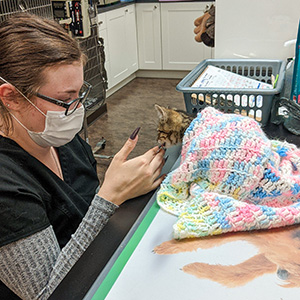When you think of bringing your pet into the veterinary clinic, what do you think your pet is feeling? For many, it may be excitement, and they come bounding in knowing they are going to see friends and get lots of treats! For others, it may be an essentially neutral experience, they may not LOVE it but they are not stressed out about it either. For those dogs and cats, our job is much easier, we just need to keep the experience as positive as possible.
 For others though, coming into a vet clinic can cause varying levels of stress, ranging from minor anxiety to full blown panic. As the world of animal behavioural science is evolving we are learning so much more about the effects of stress on our companion animals. Not only can short term stress cause increases to heart rate and blood pressure, sometimes significantly due to spikes of hormones such as cortisol and adrenaline, but elevated stress levels can also damage their gut bacteria, resulting in diarrhea or changes in their appetite. Repeated stress can also make animals more susceptible to illness and delay healing from injuries or surgery and it can affect our bond with our pet if they exhibit unwanted behaviour associated with stress.
For others though, coming into a vet clinic can cause varying levels of stress, ranging from minor anxiety to full blown panic. As the world of animal behavioural science is evolving we are learning so much more about the effects of stress on our companion animals. Not only can short term stress cause increases to heart rate and blood pressure, sometimes significantly due to spikes of hormones such as cortisol and adrenaline, but elevated stress levels can also damage their gut bacteria, resulting in diarrhea or changes in their appetite. Repeated stress can also make animals more susceptible to illness and delay healing from injuries or surgery and it can affect our bond with our pet if they exhibit unwanted behaviour associated with stress.
When an animal is experiencing severe stress they can sometimes show signs of aggression as well.This is not because they are a bad dog or because they are dominant (the dominance theory has been debunked many times over by board certified veterinary behaviourists). These animals are simply responding to what they perceive as a significant threat to their safety and so their fight, flight, or freeze response is activated. In the case of an aggressive response, this animal's instinct is to fight. Other patients make attempts to escape (flight response), may urinate or defecate, while others may simply go completely still (this is the lesser known "freeze" response to a threat - picture a rabbit that holds perfectly still, hoping not to be observed by a predator). Some pets may move through various responses, perhaps starting with flight but then switching to fight if they cannot get away.
At Gateway Pet Hospital we are working to improve the veterinary experience for all patients, whether it's to continue to keep them happy, or to address their stress at whatever level they are experiencing it. We want to avoid the need for any of the fight, flight, or freeze responses!
Prevention of stress or early intervention is much more likely to result in a successful outcome (and a happy, relaxed pet!) than to wait until their stress has escalated to a significant level. This is not so different than other forms of medicine; vaccinations prevent many serious diseases, weight loss is easier to address when only a few pounds need to be lost, resting a minor knee injury can help to prevent it from getting worse and requiring surgery, and starting insulin early on in diabetes can lead to faster regulation and avoid a diabetic crisis.
Intervention for stress can have many forms. It may be finding a way that your pet prefers to be handled and a favourite treat or toy that keeps them distracted when more stressful procedures such as nail trims, vaccines, or bloodwork are being performed. For other pets, "happy visits" where they come in to see us outside of their regular appointment to stop in for a treat and realize that we are friends, not foes, can be very helpful. However, in some cases, a patient's stress elevates to the point where these interventions are not sufficient. This may be because they are nervous in general, or we are working through prior negative experiences. In patients that are showing numerous signs of stress (such as food refusal, trying to escape the room, or body language such as ears back, licking their lips, tail tucked, yawning, panting, tense or hunched body posture) the best thing for that patient may be to provide medical intervention with oral anti-anxiety medications or even full sedation depending on their stress level. We will always consider the risks involved and pick a protocol that minimizes any risk to a patient.
 Left untreated, stress can build and worsen over time. These medications, when used at earlier levels of stress and combined with other low stress handling techniques as well working to avoid pushing a patient past their stress threshold can be incredibly helpful for a pet's overall wellbeing.
Left untreated, stress can build and worsen over time. These medications, when used at earlier levels of stress and combined with other low stress handling techniques as well working to avoid pushing a patient past their stress threshold can be incredibly helpful for a pet's overall wellbeing.
If you have any questions or concerns about your pet's stress level when coming into the hospital, please talk to us. We can work with you ahead of your appointment to make a plan to help your pet feel more comfortable.